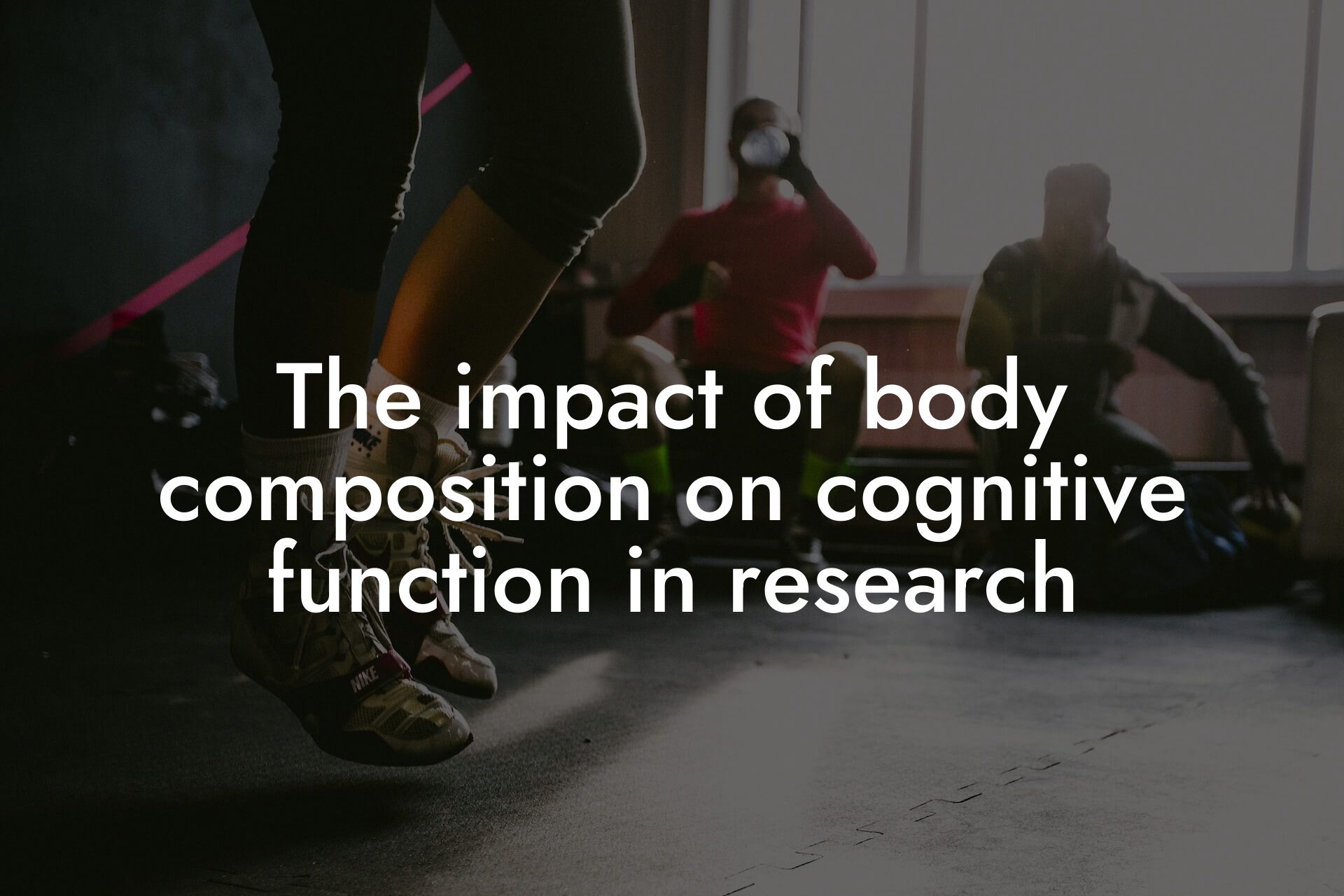As a high-earning professional, you understand the significance of staying on top of your game in your respective field. Research productivity is a crucial aspect of your success, and it's closely linked to your physical health. While it's easy to get caught up in the demands of your job, neglecting your physical well-being can have a profound impact on your ability to produce high-quality research. In this article, we'll delve into the importance of physical health in research productivity and provide you with actionable tips to improve your overall well-being.
Table of Contents
- The Impact of Sedentary Behavior on Research Productivity
- The Role of Exercise in Improving Cognitive Function
- The Importance of Sleep in Research Productivity
- Nutrition and Research Productivity
- Stress Management and Research Productivity
- The Benefits of DEXA Scans for Researchers
- Practical Tips for Improving Research Productivity through Physical Health
- Frequently Asked Questions
The Impact of Sedentary Behavior on Research Productivity
Sedentary behavior is a common pitfall for many researchers. Long hours spent sitting in front of a computer, pouring over papers, and attending meetings can lead to a lack of physical activity. This can have a significant impact on your research productivity, as a sedentary lifestyle has been linked to decreased cognitive function, reduced creativity, and impaired problem-solving skills. In fact, a study published in the Journal of Science and Medicine in Sport found that sedentary behavior can lead to a 10-15% decline in cognitive performance.
The Role of Exercise in Improving Cognitive Function
Exercise is a powerful tool for improving cognitive function and boosting research productivity. Regular physical activity has been shown to enhance executive function, improve memory, and increase the growth of new neurons in the brain. This can lead to improved focus, concentration, and mental clarity, all of which are essential for producing high-quality research. Furthermore, exercise has been found to reduce symptoms of anxiety and depression, which are common among researchers.
The Importance of Sleep in Research Productivity
Sleep is essential for physical and mental recovery, and it plays a critical role in research productivity. During sleep, your brain processes and consolidates information, and a lack of sleep can impair cognitive function, leading to decreased productivity. Research has shown that sleep deprivation can lead to reduced creativity, impaired problem-solving skills, and decreased attention span. It's essential to prioritize sleep and aim for 7-9 hours of restful sleep each night.
Nutrition and Research Productivity
Nutrition plays a vital role in research productivity, as a well-nourished brain is essential for optimal cognitive function. A diet rich in whole foods, fruits, vegetables, and lean proteins provides the necessary fuel for your brain to function at its best. Additionally, staying hydrated is critical, as even mild dehydration can impair cognitive performance. Avoid sugary drinks and foods high in added sugars, which can lead to energy crashes and decreased productivity.
Stress Management and Research Productivity
Stress is a common challenge for many researchers, and it can have a profound impact on research productivity. Chronic stress can lead to decreased motivation, impaired cognitive function, and reduced creativity. It's essential to develop effective stress management techniques, such as meditation, deep breathing, or yoga, to help mitigate the negative effects of stress. Taking regular breaks, engaging in physical activity, and prioritizing self-care can also help reduce stress and improve research productivity.
The Benefits of DEXA Scans for Researchers
As a high-earning professional, you understand the importance of tracking your physical health and making data-driven decisions. DEXA (Dual-Energy X-ray Absorptiometry) scans provide a comprehensive assessment of your body composition, bone density, and fat mass. This information can be used to optimize your nutrition and training program, leading to improved physical health and enhanced research productivity. At Tano Performance Group, we offer DEXA scans as part of our comprehensive body assessment, providing you with the insights you need to take your research to the next level.
Practical Tips for Improving Research Productivity through Physical Health
So, what can you do to improve your research productivity through physical health? Here are some practical tips to get you started:
- Schedule regular exercise sessions, such as a lunchtime workout or a morning jog, to improve cognitive function and boost energy levels.
- Prioritize sleep and aim for 7-9 hours of restful sleep each night to help your brain function at its best.
- Focus on whole, nutrient-dense foods and avoid sugary drinks and foods high in added sugars.
- Take regular breaks to reduce stress and improve focus, such as a short walk or some stretching exercises.
- Consider incorporating stress management techniques, such as meditation or deep breathing, into your daily routine.
- Invest in a DEXA scan to gain valuable insights into your body composition and optimize your nutrition and training program.
By prioritizing your physical health, you can improve your research productivity, increase your energy levels, and take your career to the next level. Remember, a healthy body and mind are essential for producing high-quality research and achieving success in your field.
Frequently Asked Questions
How does physical health impact research productivity?
Physical health has a significant impact on research productivity. When you're physically healthy, you're more focused, energized, and motivated, which enables you to tackle complex research tasks with ease. On the other hand, poor physical health can lead to fatigue, decreased concentration, and a lack of motivation, ultimately affecting your research output.
What are some common physical health issues that affect research productivity?
Common physical health issues that can affect research productivity include obesity, chronic pain, sleep disorders, and cardiovascular disease. These conditions can lead to decreased energy levels, cognitive impairment, and a lack of motivation, making it challenging to meet research deadlines and produce high-quality work.
How can regular exercise improve research productivity?
Regular exercise can improve research productivity by boosting energy levels, enhancing cognitive function, and reducing stress. Exercise also promotes better sleep, which is essential for memory consolidation and problem-solving skills. Additionally, exercise can increase the production of brain-derived neurotrophic factor (BDNF), a protein that promotes neural growth and development.
What is the relationship between physical activity and cognitive function?
There is a strong correlation between physical activity and cognitive function. Regular physical activity has been shown to improve executive function, memory, and processing speed. Exercise also promotes blood flow to the brain, which can enhance cognitive performance and reduce the risk of cognitive decline.
How can a healthy diet support research productivity?
A healthy diet provides the necessary nutrients and energy for optimal brain function. A diet rich in fruits, vegetables, whole grains, and lean proteins can improve focus, concentration, and memory. Additionally, a healthy diet can reduce the risk of chronic diseases, such as diabetes and cardiovascular disease, which can negatively impact research productivity.
What are some healthy snacks that can support research productivity?
Healthy snacks that can support research productivity include nuts, seeds, fruits, and vegetables. These snacks provide a natural energy boost and can help sustain focus and concentration throughout the day. Avoid sugary and processed snacks that can lead to energy crashes and decreased productivity.
How can sleep deprivation impact research productivity?
Sleep deprivation can significantly impact research productivity. Lack of sleep can lead to decreased focus, impaired cognitive function, and reduced motivation. Additionally, sleep deprivation can increase the risk of errors, mistakes, and accidents, which can compromise the quality of research output.
What are some strategies for improving sleep quality?
Strategies for improving sleep quality include establishing a consistent sleep schedule, creating a relaxing sleep environment, avoiding caffeine and electronics before bedtime, and engaging in relaxing activities, such as meditation or reading. It's also essential to avoid stimulating activities and heavy meals close to bedtime.
How can stress management techniques improve research productivity?
Stress management techniques, such as meditation, yoga, and deep breathing, can improve research productivity by reducing stress and anxiety. These techniques can also improve focus, concentration, and motivation, enabling researchers to tackle complex tasks with ease.
What is the role of mindfulness in improving research productivity?
Mindfulness plays a crucial role in improving research productivity by reducing mind-wandering, improving focus, and increasing motivation. Mindfulness practices, such as meditation and yoga, can also reduce stress and anxiety, leading to a more productive and efficient research environment.
How can physical health impact mental health in researchers?
Physical health has a significant impact on mental health in researchers. Poor physical health can lead to depression, anxiety, and burnout, which can negatively impact research productivity. On the other hand, good physical health can improve mood, reduce stress, and enhance overall well-being, leading to improved research output.
What are some common mental health issues that affect researchers?
Common mental health issues that affect researchers include depression, anxiety, and burnout. These conditions can lead to decreased motivation, reduced productivity, and a lack of focus, ultimately affecting research output and overall well-being.
How can a healthy work-life balance support research productivity?
A healthy work-life balance is essential for supporting research productivity. A balance between work and personal life can reduce stress, improve motivation, and increase job satisfaction. It's essential to set boundaries, prioritize self-care, and engage in activities that bring joy and fulfillment outside of work.
What are some strategies for maintaining a healthy work-life balance?
Strategies for maintaining a healthy work-life balance include setting realistic goals, prioritizing tasks, taking regular breaks, and engaging in activities that promote relaxation and stress reduction. It's also essential to establish clear boundaries between work and personal life, avoid overcommitting, and prioritize self-care.
How can physical health impact research quality?
Physical health can significantly impact research quality. Poor physical health can lead to decreased focus, impaired cognitive function, and reduced motivation, ultimately affecting the quality of research output. On the other hand, good physical health can improve focus, enhance cognitive function, and increase motivation, leading to high-quality research output.
What are some common physical health issues that affect research quality?
Common physical health issues that can affect research quality include chronic pain, sleep disorders, and cardiovascular disease. These conditions can lead to decreased energy levels, cognitive impairment, and a lack of motivation, ultimately affecting research quality.
How can regular exercise improve research quality?
Regular exercise can improve research quality by boosting energy levels, enhancing cognitive function, and reducing stress. Exercise also promotes better sleep, which is essential for memory consolidation and problem-solving skills. Additionally, exercise can increase the production of BDNF, a protein that promotes neural growth and development.
What is the relationship between physical activity and research quality?
There is a strong correlation between physical activity and research quality. Regular physical activity has been shown to improve executive function, memory, and processing speed, ultimately leading to high-quality research output.
How can a healthy diet support research quality?
A healthy diet provides the necessary nutrients and energy for optimal brain function. A diet rich in fruits, vegetables, whole grains, and lean proteins can improve focus, concentration, and memory, ultimately leading to high-quality research output.
What are some healthy habits that can support research productivity and quality?
Healthy habits that can support research productivity and quality include regular exercise, a balanced diet, adequate sleep, stress management, and mindfulness practices. These habits can improve focus, concentration, and motivation, ultimately leading to high-quality research output.
How can researchers prioritize their physical health?
Researchers can prioritize their physical health by scheduling regular exercise, preparing healthy meals, getting adequate sleep, and engaging in stress-reducing activities. It's also essential to prioritize self-care, set realistic goals, and establish a healthy work-life balance.
What are some resources available to support researchers' physical health?
Resources available to support researchers' physical health include fitness classes, nutrition counseling, stress management workshops, and mental health services. Many universities and research institutions also offer employee wellness programs, which can provide access to these resources.
How can researchers overcome barriers to prioritizing their physical health?
Researchers can overcome barriers to prioritizing their physical health by identifying their goals and motivations, seeking support from colleagues and mentors, and finding creative ways to incorporate physical activity and healthy habits into their busy schedules.
What is the role of leadership in supporting researchers' physical health?
Leadership plays a crucial role in supporting researchers' physical health by promoting a culture of wellness, providing access to resources, and encouraging researchers to prioritize their physical health. Leaders can also model healthy behaviors, provide flexible work arrangements, and recognize the importance of physical health in research productivity and quality.
Here are some related articles you might love...
- How researchers can maintain fitness during long lab hours
- Managing stress through physical fitness in scientific research
- The impact of body composition on cognitive function in research
- Quick workouts for researchers during lab breaks
- Balancing lab work with personal fitness goals
- Nutrition strategies for maintaining focus during experiments
- The role of physical fitness in preventing research-related injuries
- How to stay active during sedentary research work
- How DEXA scans can benefit scientists and researchers
Zak Faulkner
Zak Faulkner is a leading authority in the realm of physical health and body composition analysis, with over 15 years of experience helping professionals optimise their fitness and well-being. As one the experts behind Tano Performance Group, Zak has dedicated his career to providing in-depth, science-backed insights that empower clients to elevate their physical performance and overall health.
With extensive knowledge of DEXA technology, Zak specializes in delivering comprehensive body assessments that offer precise data on body fat, muscle mass, bone density, and overall physique. His expertise enables individuals to make informed decisions and achieve their fitness goals with accuracy and confidence. Zak’s approach is rooted in a deep understanding of human physiology, combined with a passion for helping clients unlock their full potential through personalised strategies.
Over the years, Zak has earned a reputation for his commitment to excellence, precision, and client-focused service. His guidance is trusted by top professionals who demand the best when it comes to their health. Whether advising on fitness programs, nutritional strategies, or long-term wellness plans, Zak Faulkner’s insights are a valuable resource for anyone serious about taking their health and fitness to the next level.
At Tano Performance Group, Zak continues to lead our Content Team revolutionising how professionals approach their physical health, offering unparalleled expertise that drives real results.




